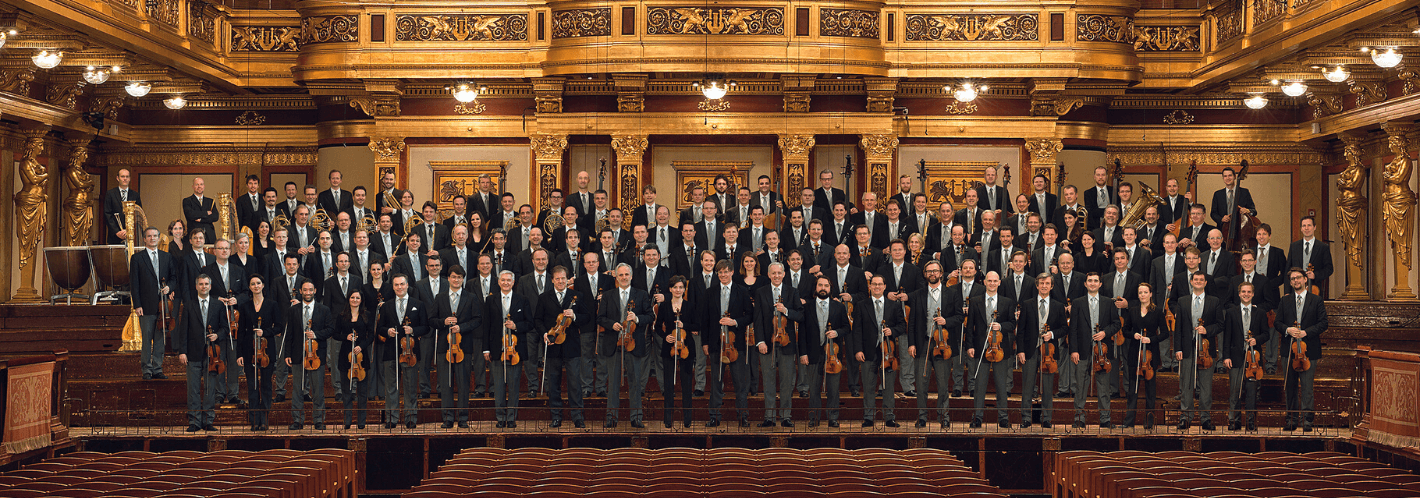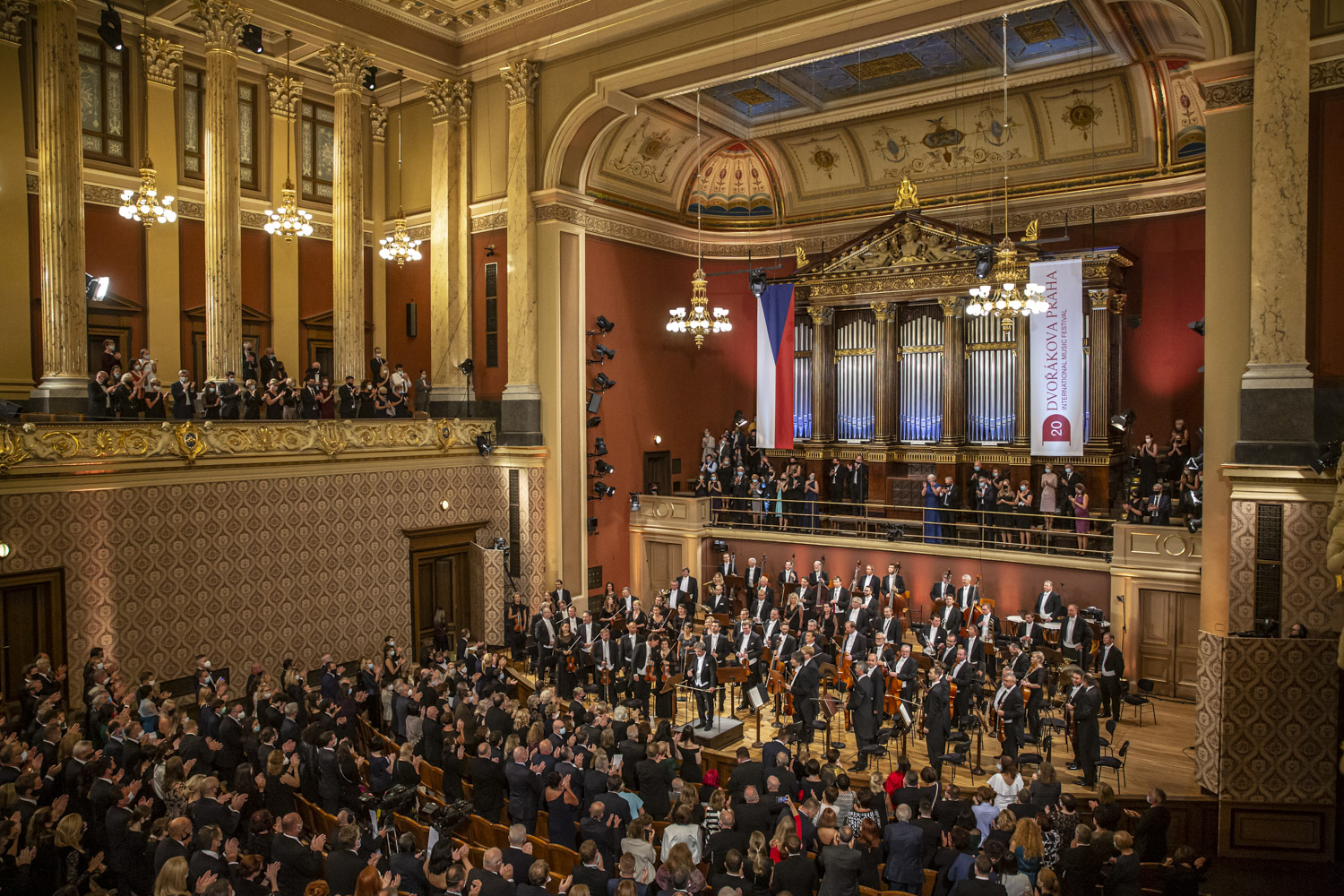
Franz Schubert: Symphony No. 8 in B minor, D 759, "Unfinished"
Anton Bruckner: Symphony No. 4 in E flat major, WAB 104, "Romantic"
You can tell a tree by its fruit, and you can tell the Vienna Philharmonic by its French horns. Of course, those peculiar brass instruments are just one of the special characteristics of the orchestra, which is on one of the most famous in the world. Its most important identifying feature is its ability to maintain a mellow, malleable sound even in the most dramatic passages. In addition, at the helm of the Vienna Philharmonic will be the dean of today’s top conductors, 93-year-old Herbert Blomstedt. For their first joint appearance at the Dvořák Prague Festival, they will be performing Franz Schubert’s “Unfinished Symphony” and the “Romantic Symphony” by Anton Bruckner.
Both composers are among the icons of Viennese music history, although they were largely ignored in their day. Now, Schubert’s “Unfinished” is one of the most frequently performed works in the whole repertoire, and Bruckner’s Symphony No. 4 is a fascinating summary of all of the achievements of German Romanticism. The Vienna Philharmonic long ago adopted the two composers as its own and added their works to its core repertoire.
There is perhaps no other musical ensemble more closely associated with the history and tradition of European classical music than the Vienna Philharmonic. In the course of the past 180 years, this orchestra has experienced and influenced the course of musical history around the world. Even to this day, prominent soloists and conductors refer to the unique "Viennese Sound" as the outstanding quality that sets it apart from other orchestras.
This success story had its origins in the desire to found a symphony orchestra dedicated to the ideal of performing at the highest level the symphonies of the Viennese classical composers, particularly Ludwig van Beethoven. This artistic goal could only be implemented through the enthusiastic affirmation of the musicians of the Vienna Court Opera Orchestra, who in 1842 made the decision to present "Philharmonic Concerts", independently of their duties at the opera theater and within a framework of complete artistic and entrepreneurial autonomy. This produced a structure based on democratic principles in which all aspects of the decision-making process rest in the hands of the musicians themselves.
One of the founding fathers was composer and conductor Otto Nicolai, to whom the maxim is attributed, "to perform the best repertoire, with the best personnel, in the best possible manner." The high quality standards implied in this statement, to which the orchestra remains obligated to this day, serves to explain the fascination that the orchestra has held from the beginning for prominent composers and conductors, as well as for audiences all over the world. The orchestra's conscious maintenance of a homogenous musical style, carefully bequeathed from one generation to the next, is an expression of its striving to uphold tradition in an innovative manner.
The inimitability of the orchestra's sound is also based on the singular relationship between the Vienna Philharmonic and the Vienna State Opera Orchestra. One of the orchestra's founding principles is that only a musician from the opera orchestra can become a member of the Vienna Philharmonic. The musicians are required to perform in both orchestras, and to this day, every future Philharmonic musician begins his or her career with an audition for the Vienna State Opera Orchestra and only after a three-year waiting period becomes eligible for full membership in the Vienna Philharmonic.
Another unique feature of this democratic structure is that the orchestra itself is solely responsible for the organization of concerts and the selection of repertoire, as well as the engaging of conductors and soloists. In 1860, the Subscription Concert Series was introduced, for which one conductor was engaged for an entire season. These concerts formed a solid artistic and economic basis that remains in place to this day. Beginning in 1933, the orchestra adapted a system of guest conductors, which promotes a wide spectrum of artistic encounters with the most prominent conductors of each generation.
Since 1870, the Golden Hall of the Musikverein in Vienna, with its unique aesthetic and acoustical characteristics, has proven to be the ideal venue for Vienna Philharmonic concerts. The orchestra's first foreign tour took place in 1900 with a concert tour to Paris under the baton of Gustav Mahler. Another memorable year was 1922, which saw not only the orchestra's first participation at the Salzburg Festival, but also the first overseas tour to South America. This marked the beginning of an active touring schedule which has taken the orchestra to all continents on the globe and in recent years has included regularly scheduled concerts in Germany, Japan, the USA and China.
The Vienna Philharmonic has made it its mission to communicate the humanitarian message of music into the daily lives and consciousness of its listeners. From the beginning, the orchestra has displayed a strong social consciousness, characterized by a commitment to individuals in need and the fostering of young musicians. Since 1999, an annual donation from the proceeds from the New Year's Concert has gone to diverse humanitarian organizations. In response to the Tsunami catastrophe in 2011, the Vienna Philharmonic and Suntory Music Aid Fund was founded.
The relationship to Japan and the Japanese audiences is so close that even in the pandemic years 2020 and 2021 the orchestra's tour to Japan took place after the implementation of extensive security measures and a tour-long quarantine. Since the beginning of the pandemic, the Vienna Philharmonic has taken a leading role through testing and studies and became the first orchestra in the world to play concerts for live audiences after the first lockdown in June 2020.
The Vienna Philharmonic serves as cultural messengers who in their performances express the ideals of peace, humanity and reconciliation. This includes performing concerts in locations of historical significance as well as controversial and painful flashpoints in political history. These include such events as the memorial concert at the former concentration camp at Mauthausen in 2000 as well as the Concert in Sarajevo in 2014 in commemoration of the outbreak of World War I and the Concert for Peace in Versailles in 2018 in remembrance of the end of World War I.
In 2018, the Vienna Philharmonic Orchestra Academy was founded. The academy students are selected in accordance with a strict, internationally oriented audition process and trained at the highest level during a two-year course of study. The 12 participants will learn not only instrumental perfection but also passion and enthusiasm through their interaction with the Vienna Philharmonic. The students will not only through private lessons learn the subtleties of the Viennese sound and style, but will also be trained in the audition process for not only the Vienna Philharmonic itself, but other orchestras as well. The members of the first academy class of 2019-2021 have successfully completed the program.
The orchestra has been the recipient of numerous prizes and awards. Since 2008, it has been supported by its exclusive sponsor ROLEX.
The Vienna Philharmonic performs approximately 40 concerts in Vienna annually, among them the New Year's Concert and the Summer Night Concert Schönbrunn, which are broadcast in numerous countries around the world. The orchestra also has an annual summer residency at the Salzburg Festival and performs more than 50 concerts a year on its international tours. All of these activities underscore the reputation of the Vienna Philharmonic as one of the world's finest orchestras.
source: Wiener Philharmoniker

The legendary Swedish conductor Herbert Blomstedt first came to wider attention of the musical public back in 1953 when he won the Koussevitzky Prize, and just two years later he won the conducting competition in Salzburg. A year before that, he had made his debut with the Stockholm Philharmonic. During his career, he has been at the helm of several of the world’s leading orchestras, including the Oslo Philharmonic, the Staatskapelle Dresden, the San Francisco Symphony, and the Gewandhausorchester in Leipzig. Maestro Blomstedt has won several international awards, honorary doctorates, and honorary conducting posts. His scope as a performer is enormously broad, but he is most noted for his unparalleled Bruckner performances characterised by analytically precise interpretation of the musical notation and depth and soulfulness of expression. Remarkably, even at over 90, he continues his tireless cooperation with several leading orchestras with tremendous artistic commitment.
The Rudolfinum is one of the most important Neo-Renaissance edifices in the Czech Republic. In its conception as a multi-purpose cultural centre it was quite unique in Europe at the time of its construction. Based on a joint design by two outstanding Czech architects, Josef Zítek and Josef Schultz, a magnificent building was erected serving for concerts, as a gallery, and as a museum. The grand opening on 7 February 1885 was attended by Crown Prince Rudolph of Austria, in whose honour the structure was named. In 1896 the very first concert of the Czech Philharmonic Orchestra took place in the Rudolfinum's main concert hall, under the baton of the composer Antonín Dvořák whose name was later bestowed on the hall.
